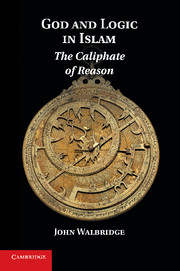Book contents
- Frontmatter
- Contents
- Illustrations
- Preface and Acknowledgements
- Spelling, Names, and Sources
- Introduction
- PART ONE THE FORMATION OF THE ISLAMIC TRADITION OF REASON
- 1 The Problem of Reason in Islam: Is Islam a Non-Rational Religion and Civilization?
- 2 The Diversity of Reason
- 3 Empirical Knowledge of the Mind of God
- 4 The Failure of the Fārābian Synthesis of Religion and Philosophy
- 5 Mysticism, Postclassical Islamic Philosophy, and the Rise and Fall of Islamic Science
- PART TWO LOGIC, EDUCATION, AND DOUBT
- PART THREE THE FALL AND THE FUTURE OF ISLAMIC RATIONALISM
- Selected Bibliography
- Index
1 - The Problem of Reason in Islam: Is Islam a Non-Rational Religion and Civilization?
Published online by Cambridge University Press: 01 March 2011
- Frontmatter
- Contents
- Illustrations
- Preface and Acknowledgements
- Spelling, Names, and Sources
- Introduction
- PART ONE THE FORMATION OF THE ISLAMIC TRADITION OF REASON
- 1 The Problem of Reason in Islam: Is Islam a Non-Rational Religion and Civilization?
- 2 The Diversity of Reason
- 3 Empirical Knowledge of the Mind of God
- 4 The Failure of the Fārābian Synthesis of Religion and Philosophy
- 5 Mysticism, Postclassical Islamic Philosophy, and the Rise and Fall of Islamic Science
- PART TWO LOGIC, EDUCATION, AND DOUBT
- PART THREE THE FALL AND THE FUTURE OF ISLAMIC RATIONALISM
- Selected Bibliography
- Index
Summary
In a widely circulated article on the state of the Islamic world in the aftermath of the World Trade Center attacks of 2001, the Pakistani physicist Pervez Hoodbhoy argued that a thousand years ago, there was an Islamic golden age of reason and science under the ‘Abbāsids, a period in which theology was dominated by the rationalist Mu‘tazilites and science and philosophy by translations of Greek works. This age of tolerance and creativity, Hoodbhoy claimed, came to an abrupt end when Ghazālī attacked logic and science in the name of an antirationalist Ash‘arite theology. Thereafter, the Islamic world settled into a dogmatic slumber that has not yet ended, as evidenced by the miserable state of science in the Islamic world. A variation of this view stresses Ghazālī's defense of Sufism as the source of his antirationalistic position. Of course, the picture could be reversed, with the early centuries of Islam being seen as a time when advocates of pagan rationalism challenged the young Islamic revelation, only to be defeated by defenders of orthodoxy like Ghazālī, leaving the stage open for a purer Islam based on the practice of the Prophet, not the fallible speculations of human philosophers and scientists. This is the view of Ibn Taymīya and his modern followers.
Outside perceptions of Islam are more negative. The Western view of Islam is dominated by media coverage that stresses terrorism, a supposed innate Islamic hostility to the modern Western world in general and to America and the Jews in particular, headscarves as a tool for the oppression of women, and violent responses to trivial offenses like tasteless cartoons.
- Type
- Chapter
- Information
- God and Logic in IslamThe Caliphate of Reason, pp. 9 - 14Publisher: Cambridge University PressPrint publication year: 2010



